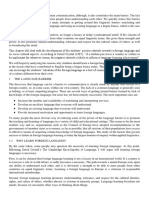0% found this document useful (0 votes)
51 views4 pagesUnit 10 Communication
The document discusses various aspects of communication, including preferences for email and texting, sources for studying and news, and leisure activities. It emphasizes the importance of participating in English-speaking clubs for improving speaking skills and outlines the benefits of globalization, such as easy travel, cultural exchange, and economic growth. Additionally, it addresses the significance of learning foreign languages and the impact of English as a global language on local cultures.
Uploaded by
thang ngocCopyright
© © All Rights Reserved
We take content rights seriously. If you suspect this is your content, claim it here.
Available Formats
Download as DOCX, PDF, TXT or read online on Scribd
0% found this document useful (0 votes)
51 views4 pagesUnit 10 Communication
The document discusses various aspects of communication, including preferences for email and texting, sources for studying and news, and leisure activities. It emphasizes the importance of participating in English-speaking clubs for improving speaking skills and outlines the benefits of globalization, such as easy travel, cultural exchange, and economic growth. Additionally, it addresses the significance of learning foreign languages and the impact of English as a global language on local cultures.
Uploaded by
thang ngocCopyright
© © All Rights Reserved
We take content rights seriously. If you suspect this is your content, claim it here.
Available Formats
Download as DOCX, PDF, TXT or read online on Scribd
/ 4







































































































